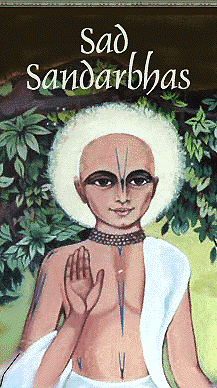
BY: SUN STAFF
Feb 15, CANADA (SUN) —
Bhagavat Sandarbha
by Srila Jiva Goswami
SECTION THIRTEEN
Lord is the fountainhead of mutually conflicting potencies - II
Similarly, Dhruva Maharaja also prays (S.B. 4.9.16):
My dear Lord, in Your impersonal manifestation of Brahman there are always two opposing elements, knowledge and ignorance. Your multi-energies are continually manifest, but the impersonal Brahman, which is undivided, original, changeless, unlimited, and blissful, is the cause of the material manifestation. Because You are that same impersonal Brahman, I offer my respectful obeisances unto You.
Anupurvya means that the various potencies of the Lord have the divisions of best, medium, and lower in their respective categories. Although generally they are antagonistic to one another, yet they all conduct their respective affairs and exist eternally in the Lord, who is their only support.
COMMENTARY
Srila Jiva Gosvami now gives further evidence that the Lord has opposing potencies. In this verse Dhruva Maharaja prays to the Lord, who is standing before him in His personal form, yet he says that the Lord is Brahman. He is only bliss, with no transformations and is unlimited. In fact these attributes which apply to impersonal Brahman also apply to the Personality of Godhead. He is the source of the universe (visvabhavam) and yet undergoes no transformation. Generally a source or cause has to undergo a change to produce such as a seed turns into sprout. He is unlimited, all pervading, yet He is a person. This is contradictory, yet all such contradictions are reconciled in the Supreme Lord, who is the Absolute Truth. Hence the Absolute Truth may be defined as that level of reality wherein all contradictory extremes meet and are reconciled.
As explained earlier, Brahman is non-different from Bhagavan, and therefore the qualities in Brahman are found in Bhagavan as well; but the distinction lies in the vision of the particular transcendentalist, according to his individual mode of worship. For the jnani bhaktas he appears as Brahma. For those who are more advanced in bhakti He appears as visvabhavam, and for more advanced devotees He appears as full of bliss ananda-matram.
The Sruti explains these opposing characteristics:
"The Supreme Lord walks and does not walk. He is far way, but He is near as well. He is within everything, and yet He is outside of everything." (Isopanishad 5)
The Svetasvatara Upanishad (5.19) states, pasyatyackshuh sa srinoti akranah (5.19), "He sees, though He has no eyes, and He hears, though He has no ears."
And in the Bhagavad-gita (13.15) Lord Krishna says:
"The Supersoul is the original source of all senses, yet He is without senses. He is unattached, although He is the maintainer of all living beings. He transcends the modes of nature, and at the same time He is the master of the modes of nature."
In the previous text the cited verse said that Lord's energies are object of dispute among various philosophers. But no description of these energies or the nature of dispute was given. In this text the verse reveals about the energies such as knowledge and ignorance. In the next text more details are given about the activities of these energies.
Go to Section Fourteen
Return to Section Twelve
